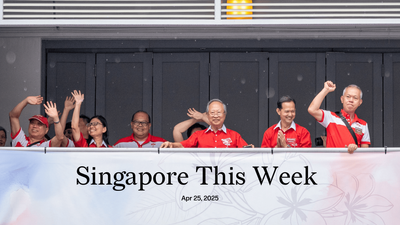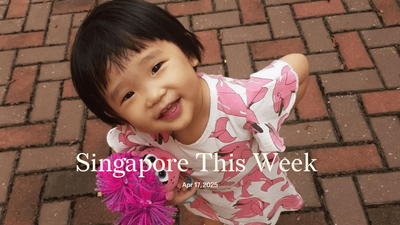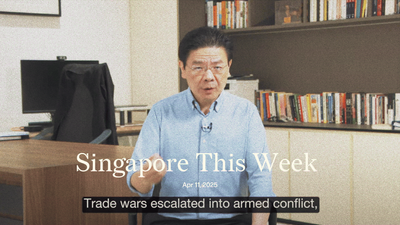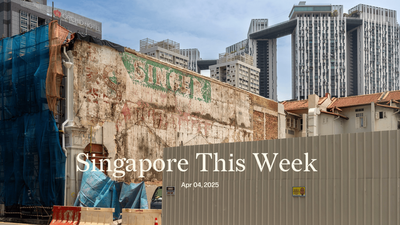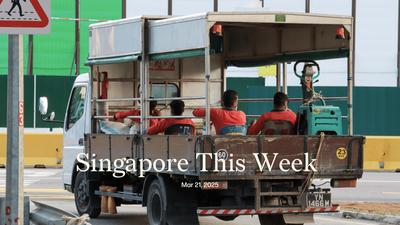Society: Matar lai liao
The Singapore Police Force (SPF) has deployed two robots in Changi Airport. Their advanced sensors enable them to perform retinal scans from 50m away to determine if somebody is lying; to detect THC, the main psychoactive compound in cannabis, in globules of sweat on arriving passengers (especially those from Bangkok); and to assess, from a non-Singaporean’s body language, if they are likely to be sympathetic to gay rights or against the death penalty. The robots are real, those powers are not (yet). For now, the 1.7m-tall robots—equipped with 360-degree cameras, sensors, speakers, a display panel, blinkers and a siren—will be used, SPF said, to “project additional police presence” at the airport: offering more eyes, enforcing cordons, warning bystanders. Their speakers can be used to deliver audio messages, orders and instructions—in a voice cloned from minister K Shanmugam (not yet). The robot’s name is “Multi-purpose All Terrain Autonomous Robot (Matar)”, a play on mata, literally “eyes” in Malay but used colloquially to refer to the police (mata-mata). Early Matars were deployed in hot spots like quarantine facilities and worker dormitories, where they were used to bark at workers who apparently didn’t observe safe distancing measures while queuing for food. Other robots at Changi Airport perform waste collection, concierge duties, landscaping jobs, and traffic patrols. Matars are now only in Terminal 4. But one hopes that an eventual consciousness sees them breaking into Jewel, finding their way to the waterfall, and whirring around it in sweet harmony. If that were to happen—infertile bots falling in love—then Jewel’s Faux Singapura projection would be complete.
Society: SPF may investigate SPH
SPH Media Group, which publishes The Straits Times (ST) and many other titles, has filed a police report following a recommendation from Allen & Gledhill, the law firm it hired to assist with an internal investigation into the company’s overstating of its circulation numbers (by 82,600 copies in August 2021). The firm’s audit and risk committee released its findings on Wednesday, detailing numerous potential ethical and financial improprieties. The Newspapers in Education (NIE) Fund, for instance, was created as far back as 2000 for the distribution of bulk copies to students, needy families, halfway houses and charities, specifically to increase SPH publications’ readership. These bulk copies enabled it to meet circulation targets—and would peak in August, in preparation for inclusion in its annual report. Bulk copies through the NIE fund constituted over half of the overstated number. Some of the NIE copies involved SPH printing copies for schools even after they said they wanted only digital copies. The printed copies were delivered to a warehouse in Kaki Bukit and then thrown away. Separately, an unnamed airline paid SPH for unlimited digital downloads of various titles including ST, Lianhe Zaobao, Berita Harian and Tamil Murasu. Even though only 110-220 copies were downloaded daily, SPH reported it as 2,500. Meanwhile, from 2016, some ordinary subscribers to SPH’s “all-in-one” subscription package told the company that they no longer wanted print copies—SPH printed them anyway, likely destroyed them, and then included them in its circulation count. These are just some of the shenanigans that we now know occurred under the watch of Ng Yat Chung, disgraced former CEO. “I note with regret and disappointment that certain individuals in the SPH Media circulation department appeared to have misconducted themselves in relation to circulation numbers during the period of review by the (audit and risk committee),” he said in response to the report. As often happens in Singapore, the elite leader—in this case also a former army general—is not to blame.
Society: Summer school
The Ministry of Education (MOE) has for the first time scrapped mid-year exams for all primary and secondary school students—including those in Primary 6 and Secondary 4 who are due to take national exams at the end of the year. The measure is aimed at “freeing up time to pace out learning and support the use of more varied learning activities,” in order to encourage the joy of learning. But don’t cheer yet, kids. Killjoy tuition centres are now offering their own mock mid-year exams, and slots are filling up fast. “They [parents] said they would love to have mock exams,” said Darrell Er, the founder of (aptly named) Overmugged, a tuition centre. The persistent demand for mid-year exams, even at one’s own cost, speaks to the deeply entrenched competitiveness in Singapore’s education system (a topic explored in a previous Jom essay). Despite regular assessments and quizzes, 300 O- and A-Level students still signed up for mock exams at Overmugged, citing worries about missing an academic check-point. The anxiety experienced by both parents and students continues to fuel the local billion-dollar tuition industry, a trend anticipated five years ago by then education minister Ong Ye Kung, when MOE first announced the removal of mid-year exams. Ong had urged tuition centres not to “prey on the apprehension and anxieties of parents,” making an impassioned plea for tuition teachers to “try to understand why these changes are important to better prepare our young for the future, and help explain this to parents.” As MOE rolls out its policy changes under the Learn for Life scheme, it’s becoming increasingly clear that a radical shift in mindset for all (educators, parents, students, society at large) is required for real, sustainable change in the education system. Until then, the sign-up sheets for mock exams are likely to remain filled.
Earth: Government responds to Kempen ESG blacklist
Singapore’s government has reaffirmed that it takes “climate action seriously”, has carried out “key steps” to achieve net zero emissions by 2050, and is committed to “decarbonising its electricity generation.” It was responding to a Bloomberg article about the country’s state-backed assets being blacklisted over environmental concerns. In an updated ESG (environmental, social and governance) test conducted by Van Lanschot Kempen, Asia’s wealthiest country per capita failed the Dutch asset manager’s screening for environmental risks, and was hence excluded from its portfolio (along with China, Russia and Saudi Arabia). “Unfortunately the direction of travel in both biodiversity and climate is in reverse,” said a Kempen senior executive. “They’re [Singapore] not seeing the same kind of positive improvements we expect from quite advanced economies...” This stinging criticism was met with a firm rebuttal in a joint statement from several agencies and ministries. They invited Kempen to “learn more” about Singapore’s commitments and actions on sustainability, including South-east Asia’s only carbon tax. Authorities also said that the city-state’s share of renewable energy, only solar, had increased from 0.17 to 0.71 percent from 2016 to 2021, countering a supposed erroneous claim that it had fallen. (It’s lower than in many other countries due partly to a limited land area for, say, wind farms.) ESG is a holistic framework used by investors to screen how businesses manage risks and opportunities. It’s not without its detractors. Some have argued that the system over-promises and under-delivers, and has had a “negligible impact on carbon emissions, especially by the biggest polluters.” But despite its flaws, it’s still a useful tool to push companies (and states) to do better for the planet and its people.
Arts: Foreign talent
International music acts Coldplay and Taylor Swift are set to play multiple dates at the National Stadium next year. Coldplay initially announced an unprecedented run of four nights here and sold all 200,000 tickets for those shows during the presale. They then added a fifth, then a sixth and final show due to overwhelming demand. This makes Singapore the British band’s longest stop on their Music of Spheres World Tour. Not all of those seats will be filled by locals. Regional fans are also expected to attend the gigs. Malaysians, with only one local show, are blaming conservative groups like Parti Islam Se-Malaysia (PAS, the Malaysian Islamic Party) for scuppering their chances of becoming a hub for international tours. PAS protested the upcoming concert’s alleged promotion of “deviance”. Harsh words for a band whose live shows are known for biodegradable butterfly-shaped confetti. Singapore is definitely capitalising on its relative edge over other potential concert venues in the region. Taylor Swift’s three shows are proudly being touted as “the only stop in South-east Asia”. Clad in a Singapore Sports Hub Dri-Fit polo, Edwin Tong, the minister for culture, community and youth, posted a triumphant video on Instagram to share the news. Singapore Tourism Board is an official partner of this leg of the Eras Tour, suggesting some behind-the-scenes negotiations may be responsible for this huge deal. Besides Swifties, United Overseas Bank’s the other big winner. The concert’s official bank partner has reported a rush on sign-ups after news broke that presale tickets would be reserved for its cardholders. Scalpers are also hoping to strike gold. Some Coldplay CAT 1 tickets have been listed online for S$1,500, a five-time markup.
Arts: Leadership renewal at ITI
The Intercultural Theatre Institute (ITI), one of Singapore’s most significant arts education institutions, has completed its first leadership succession in its 23 years of operation. Actor and director Koh Wan Ching will replace T Sasitharan as the head of acting next month. Koh has worked for some 20 years in various theatre companies, including Drama Box, The Necessary Stage and Wild Rice. She joined ITI in 2020, teaching acting and movement, and will now manage the Professional Diploma in Intercultural Theatre (Acting) course. “Sasi” will remain the institute’s director. He, along with the late Kuo Pao Kun (both Cultural Medallion recipients) co-founded ITI as the Theatre Training & Research Programme in 2000. The school takes in just 12 students each year. Despite this relatively small footprint, it boasts alumni from 18 countries, a testament to its global reputation. Its acting programme is unique in its focus on the traditional theatrical forms of Asia, immersing its students in Japanese Noh Theatre, Indonesian Wayang Wong and Beijing Opera, to name a few. The school’s most famous alum is Yeo Yann Yann, winner of two Golden Horse awards for her collaborations with filmmaker Anthony Chen, and lead actress in the television series “American Born Chinese” alongside Michelle Yeoh. “ITI is about living traditions, and people. I want more people to know ITI and its unique programme, charged with the traditional and the contemporary,” Koh said.
History weekly by Faris Joraimi
Last month, UNESCO recognised the Hikayat Aceh as part of its Memory of the World register, a list of “documentary heritage” that contains “world significance and outstanding universal value.” The Hikayat Aceh (Tale of Aceh), a historical saga written in Malay using the Arabic script (Jawi), is about the life and reign of Iskandar Muda (1583-1636), a sultan who led the kingdom of Aceh in northern Sumatra to its golden age. Under his rule, Aceh became a leading centre of international trade in South-east Asia, with its capital Kotaraja (Banda Aceh today) hosting a diverse population from Asia and Europe. Enjoying close ties with major Islamic empires of the time, the Mughals and the Ottomans, Aceh had a feared military. With cannons and guns, Iskandar Muda subdued many smaller Malay polities and in a 1613 campaign against the Johor sultanate, attacked and razed its tributary port-town Singapura. Iskandar’s expansionist ambitions lived up to his name, which means “young Alexander” in Malay, a reference to the Macedonian world-conqueror who later entered Islamic legends as the ruler par excellence. Like many Malay chronicles, the Hikayat Aceh imaginatively blends Persian, Indic and local models of writing history: a truly “universal” work, much like Aceh itself, back when “universal” did not mean “European”. English envoys had to seek permission to set up a trading post in Aceh in 1615, which Iskandar graciously declined. But the English travellers described a fabulous kingdom of festivals, ceremonies, and fine craftsmanship. Sixty-four submissions were inscribed into UNESCO’s register this year alongside the Hikayat Aceh, including records of the Non-Aligned Movement’s first summit (1961), enslaved people in former Dutch and French colonies, and Korea’s Donghak Peasant Revolution (1895). The Hikayat Aceh’s bid was made jointly by Indonesia and the Netherlands, which together house its three surviving manuscripts, the oldest being from around 1675-1700.
Tech: Grab U-turns on lay-offs
In a shock move, ride-hailing platform Grab announced on Tuesday that it would be laying off 11 percent of its workforce: over 1,000 employees. Both CEO Anthony Tan and COO Alex Hungate had earlier said the company would not lay off employees, something that comparable firms, such as Sea Group, have done. The firm was also on track to hit group adjusted EBITDA breakeven this year, after five consecutive quarters of improved profitability. So what prompted the U-turn? In a Tech in Asia article, it was suggested that Grab’s current trajectory would yield an additional US$52m (S$69.7m) in additional adjusted EBITDA by Q4 2023—US$14m (S$18.8m) from breaking even. Coincidentally, during ride-hailing rival GoTo’s earnings call for Q1 2023, the company estimated that its November lay-offs generated US$14m (S$18.8m) in savings—some suspect Grab may be trying to emulate GoTo in order to break even by Q4. Reasons such as generative AI (artificial intelligence) and increasing cost of capital were cited by Tan in his lay-off message to employees. Yet, it’s unclear how much generative AI can replace corporate functions like engineers, marketers and HR staff. Rising cost of capital is not a new issue either and has been an issue faced by high growth, capital-intensive tech companies since early 2022. Another possibility is that Grab’s drastic move is a bid ultimately to shore up shareholder confidence given that their stock performance has lagged Uber (up 94 percent the past year). Whatever the case, the U-turn has surely left several employees feeling that their trust in the company has been betrayed. Survivors will worry about the next round of lay-offs. All does not bode well for Grab’s internal morale.
Tech: Building an automotive empire
In the span of a week, Carro, an online automotive marketplace (and tech unicorn), announced two strategic investments. One is with Hong Kong-based conglomerate Jardine Matheson, in a deal worth more than US$60m (S$80.1m). Jardine has an extensive presence in the industry, including stakes in Astra International, an automotive group in Indonesia, Truong Hai Group Corporation, Vietnam’s leading car maker, and Republic Auto, a Singapore-headquartered secondhand car dealer. The deal will see Carro receiving a stake in Republic Auto, with Jardine getting an equivalent stake in Carro. The second deal is Carro’s strategic investment in Driven Communications, a Malaysian owner of several automotive websites. The two strategic partnerships enable Carro to deepen its footprint in Malaysia, with Jardine and Carro launching a joint venture in the automotive aftermarket business targeting Singapore and Malaysia. Carro will also be able to access a quality inventory of cars from Jardine’s network of automotive companies. The announcement comes amidst Carro’s strong financial performance where it doubled its revenue to more than US$800m (S$1.1bn) and achieved positive EBITDA of US$4m (S$5.3m). This would likely help to preserve some of the US$360m (S$480.4m) that SoftBank’s Vision Fund 2 invested in 2021. Nonetheless, the growth that Carro continues to achieve in a capital constrained environment is impressive, especially given that it has now achieved EBITDA breakeven.
If you enjoy Jom’s work, do get a paid subscription today to support independent journalism in Singapore.



